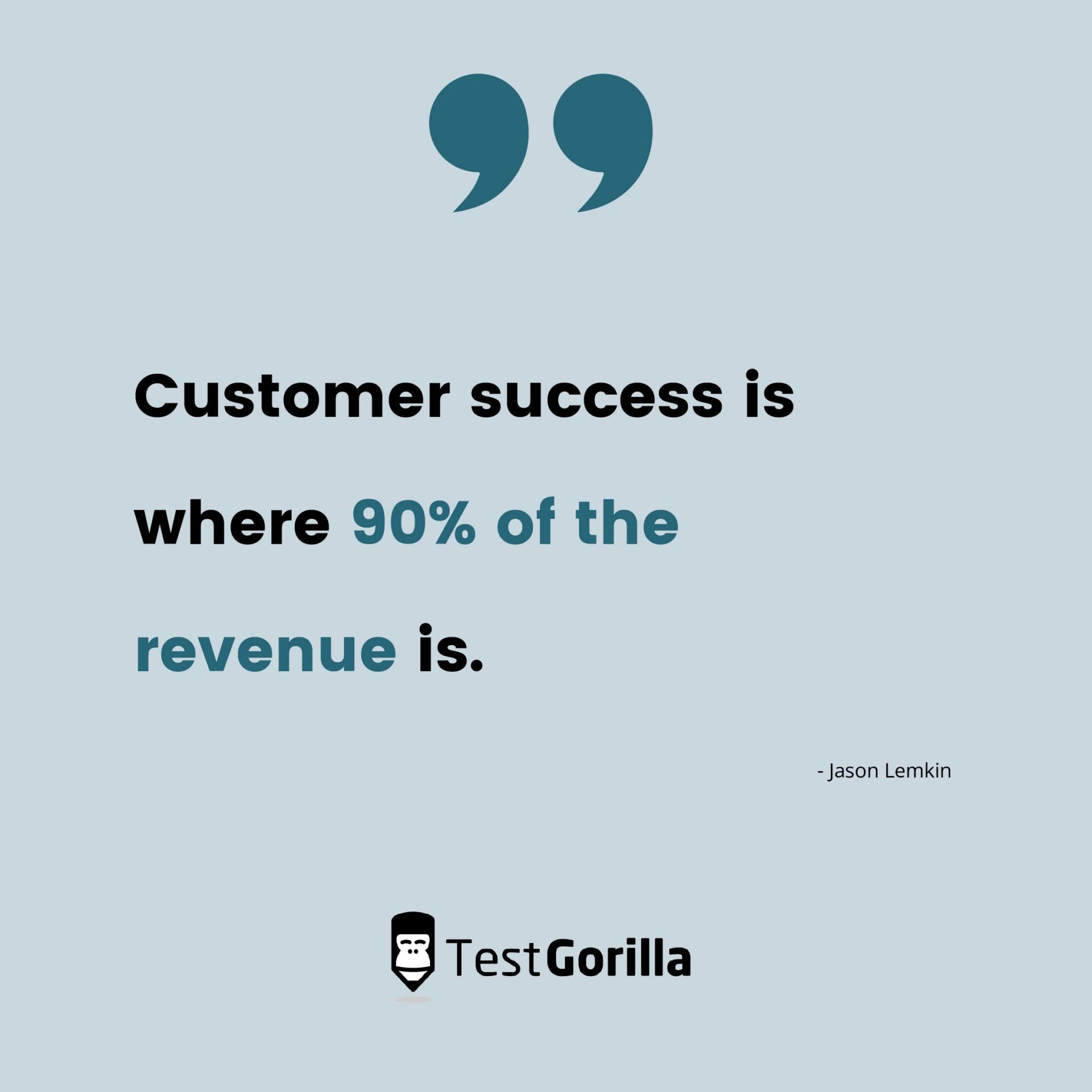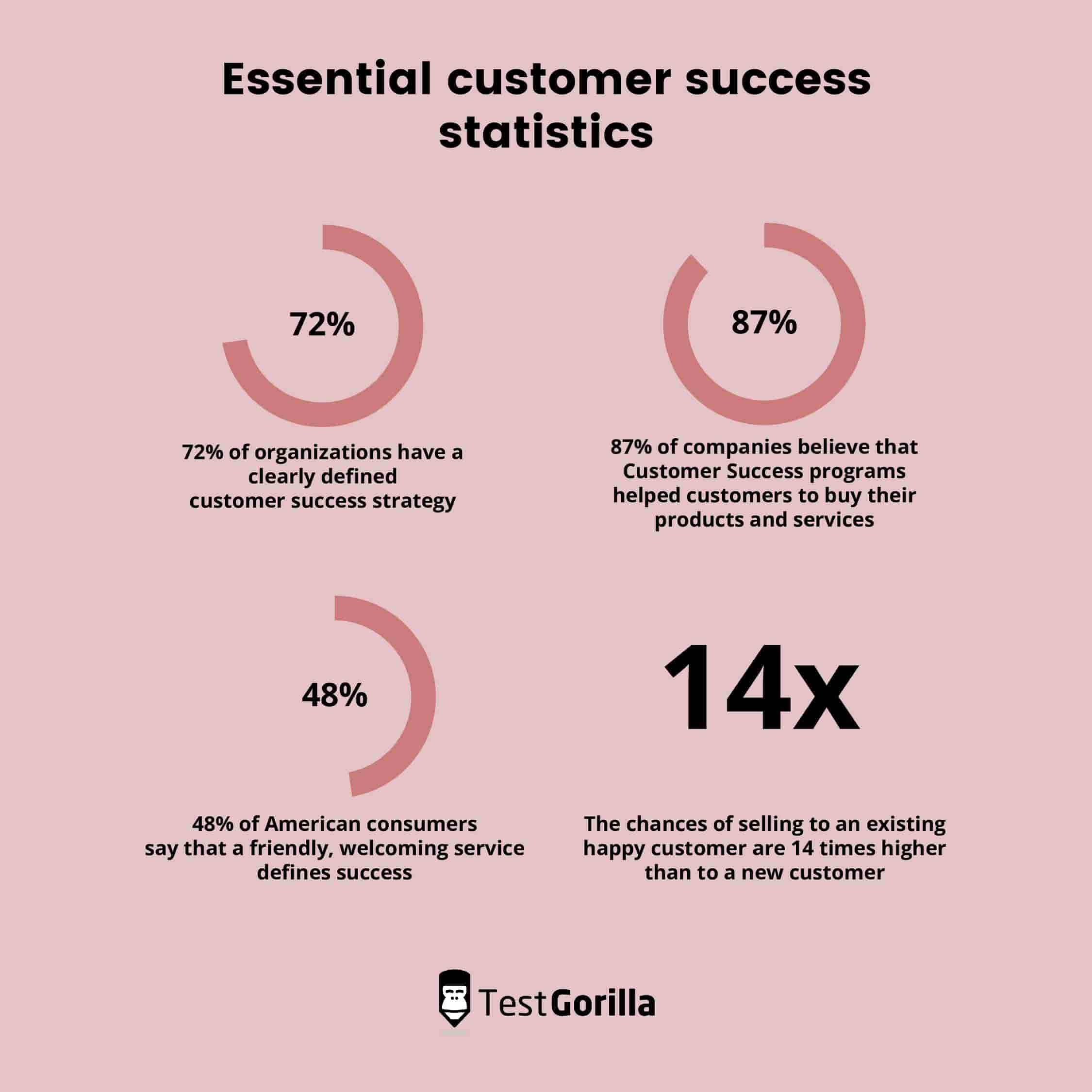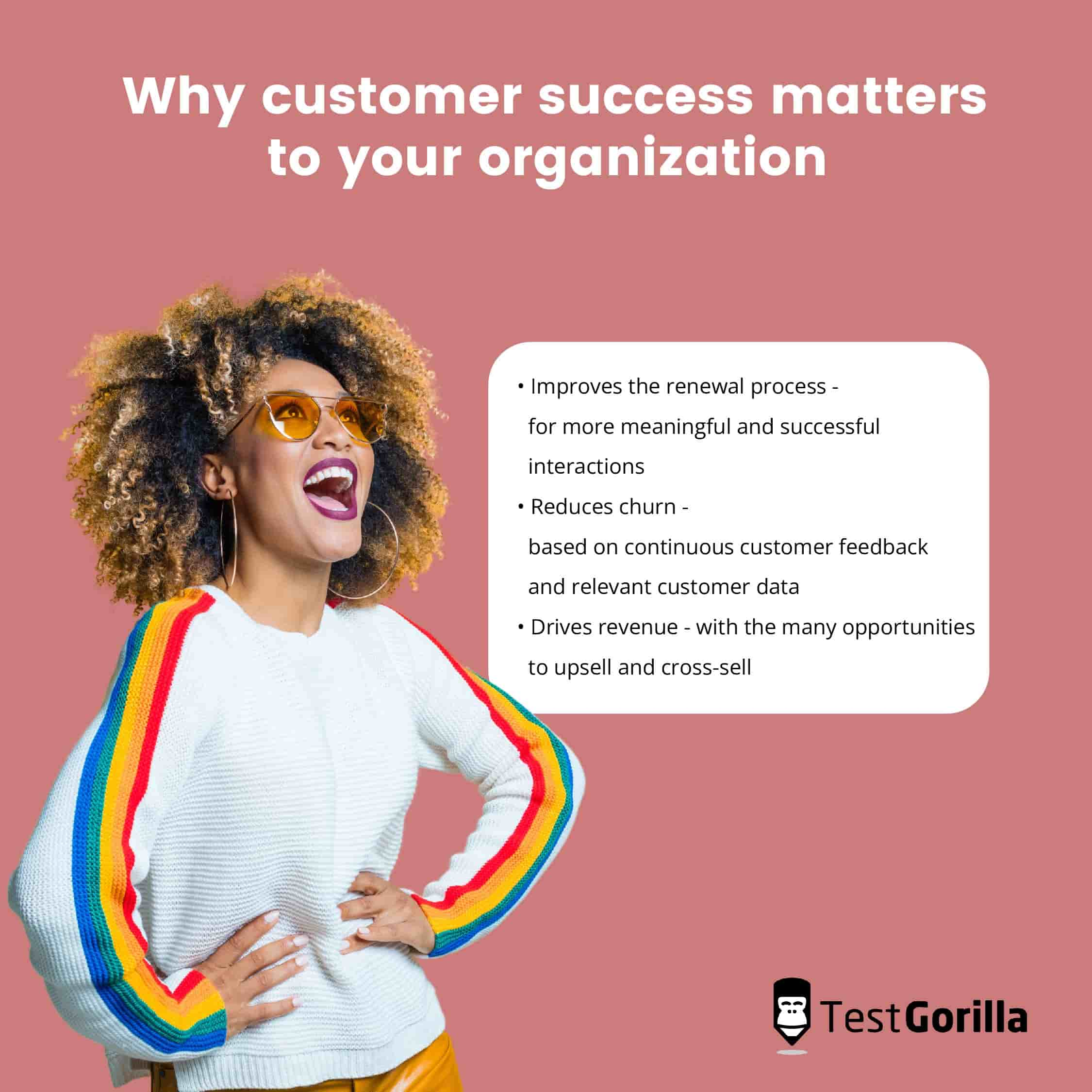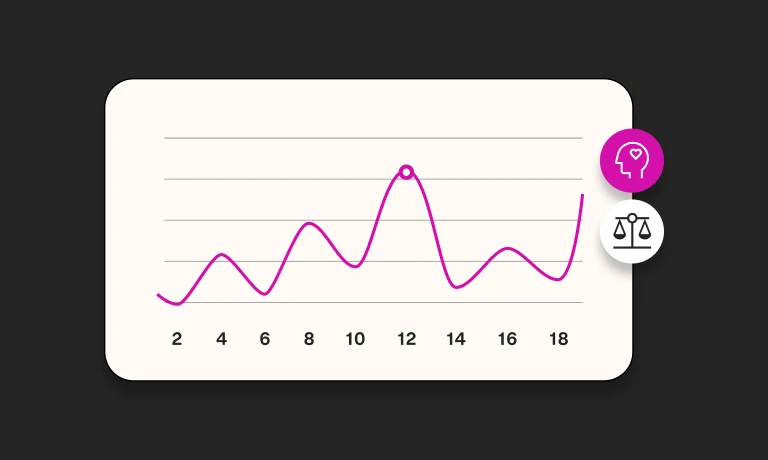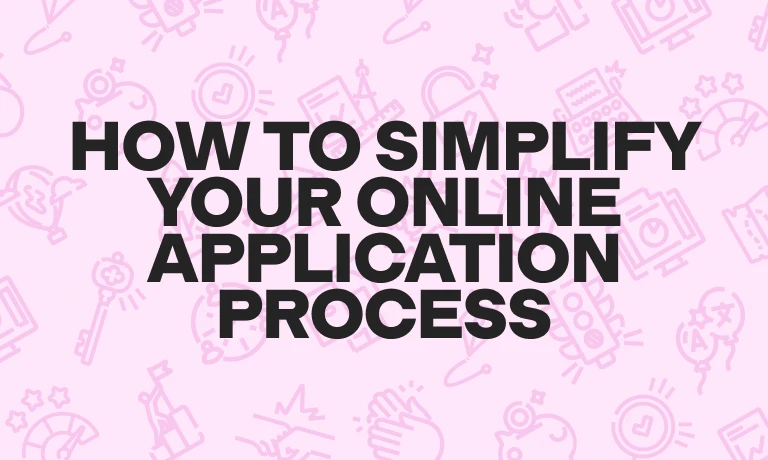Top 7 hard and soft customer success representative skills and tips for assessing them
The next customer success representative you hire will have many responsibilities to take on.
Aside from enhancing the customer experience, customer success representatives must ensure engagement with your company’s product remains high.
Technical customer success representative skills and soft skills are vital for achieving these responsibilities.
But which skills are the most important? No sweat, if you don’t know.
All the information you need about customer success representative skills is in this article. Read to the end to find out which skills are most important.
Table of contents
- What 4 key priorities contribute toward customer success?
- Which 3 soft customer success representative skills are the most important?
- Which 5 hard customer success representative skills are the most vital?
- How to assess customer success representative skills
- Hiring customer success representatives is easier with skills tests: Check out TestGorilla
What 4 key priorities contribute toward customer success?
We’ll get to the skills in a moment. But first, let’s look at how customer onboarding, product success, customer success, and company success contribute to customer success.
Your next hire will be responsible for these priorities.
1. What does customer onboarding success mean?
Customer onboarding success refers to the steps customers go through to use your company’s product. Customer success representatives must understand the entire journey that customers go through to deliver them the best value when they use the product.
With the right customer success representative skills, your next hire can take responsibility for customer onboarding duties.
2. What does product success involve?
Product success – another key priority for customer success representatives – involves determining whether the customer has adopted your product.
Your applicants must be capable of identifying your customers’ requirements and understanding how to find out whether the product solves your customers’ needs.
Your applicants should know some of the factors that contribute to product success, which include:
A narrower scope for your product
The ability to notice customer concerns related to a product
A set of criteria for product success and failure
3. What does customer success require from your next hire?
To achieve customer success, your next hire must know how to assess whether your customers are getting the outcomes the sales team guaranteed them.
Using client management methods that center on customer relationships, your next customer success representative should be able to track whether the customer’s desires and your company’s goals are aligned.
Applicants must have the right customer success representative skills to use client management methods and achieve customer success.
4. What does company success require customer success representatives to do?
Customer success representatives should know how to assess customer retention, churn, growth, renewals, and upsells. Your applicants should know how such factors translate into company success and how to track each of these metrics.
To manage these five key responsibilities, your customer success representatives should have the right experience, soft skills, and hard customer success representative skills.
Which 3 soft customer success representative skills are the most important?
When assessing customer success representative skills, remember that the most critical soft skills to evaluate are communication skills, empathy, and time management.
Find out why these soft skills are essential in the sections below.
1. Communication skills
Effective communication is essential when engaging with customers – not just during positive interactions but to build bridges when customers are unhappy. Poor communication can lead to customer disappointment.
For example, a customer success representative may miscommunicate with a customer. They may claim to solve a problem within a specific time but fail to meet the promised deadline and forget to tell the customer why there were delays.
With poor communication comes poor customer success, so ensure your applicants have the right communication skills for your company.
2. Empathy
Customer success representatives should recognize the value of empathy when trying to understand a client’s issues. But empathy goes beyond acknowledging the problem itself; instead, candidates should seek to understand the impact of the problem on the customer.
Even if your next customer success representative doesn’t immediately know how to solve your customer’s problem, empathy will enable a better relationship and greater insight into how an issue may be addressed.
3. Time-management skills
There are plenty of tasks that your customer success representative will need to complete. From communicating with customers to responding to an email to speaking with customers on the phone, customer success representatives must handle many responsibilities.
To complete these tasks efficiently, your applicants need exceptional time-management skills, including an ability to create schedules and plan each task.
The best insights on HR and recruitment, delivered to your inbox.
Biweekly updates. No spam. Unsubscribe any time.
Which 5 hard customer success representative skills are the most vital?
You may be unsure which hard customer success representative skills to prioritize when hiring.
Some of the most important ones include sales skills, customer obsession, customer service, data handling skills, and high-level conversation skills. Find more information on these vital hard skills below.
1. Sales skills
Sales skills and experience are essential for customer success representatives. There are a few sales sub-skills that applicants may have which can contribute to customer success.
Some of the sales sub-skills that should catch your attention include:
Asking questions – applicants should know how to ask the right questions when building customer relationships. For example, do they know that open-ended questions are important to learn more about their customers?
Using active listening – candidates should have active listening skills to glean information from their customers and complete customer onboarding.
2. Customer obsession
Alongside pulling out all the stops for customers, customer obsession is another crucial skill that can contribute to customer success.
It’s different from empathy since it includes different customer obsession strategies such as:
Being proactive with customer service
Making data-driven choices for customers
Communicating efficiently using cross-channel methods
Using extreme empathy across all touchpoints
Although customer obsession can include empathy, these other strategies set it apart from empathy.
Applicants should know how to use customer obsession effectively and walk a mile in their customers’ shoes when understanding the problems they’re experiencing with a product.
3. Customer service
Customer service and its many sub-skills are vital for customer success representatives. Applicants should show that they can avoid poor impressions, determine the cause of customer inquiries, and come up with solutions for customers.
Do your applicants have the required customer service skills to provide professional support for your customers?
4. Data-handling skills
High-level data science knowledge is not required for customer success representatives, but your applicants should know how to use SQL or Python to handle data.
Can your applicants show they have the data-handling skills to track changes in the company-client relationship and customer satisfaction?
5. High-level conversation skills
It’s critical that your candidates have high-level conversation skills. This involves being assertive and taking the lead in a conversation to steer it in the right direction.
How to assess customer success representative skills
There are two stages for assessing customer success representative skills.
Begin with skills testing when you start getting customer success representatives inquiring about your open role and then invite applicants to an interview.
Assessing customer success representative skills with skills testing
Here’s how to assess customer success representative skills using a simple, four-step skills-testing method.
1. Visit TestGorilla and build an assessment that features a customer success representative test.
Commence your skill-testing evaluation process by visiting TestGorilla and building an assessment to test your customer success representative candidates. Your assessment can feature up to five tests to ensure you can evaluate applicants thoroughly.
2. Customize the assessment
You’ll have the opportunity to adjust and customize the assessment. Two custom options are available – you can change the logo to display your company’s brand and select a color scheme that reflects it.
3. Invite customer success representative candidates to take the assessment
Sending invitations is easy. You can use a public link to invite candidates, or simply use the TestGorilla platform or your ATS to distribute invitations.
4. Get all the advantages of automated assessment results
TestGorilla gives you nothing but the best quality data – get all the benefits of automated assessment result calculation. Just look at the results to check which candidates you want to invite to an interview.
Evaluating customer success representative skills: 3 tips for interviewing applicants
If your hiring process is about to enter the interview stage, consider these three tips when interviewing applicants.
1. Inform all applicants about your company, its products, and your role
Since an interview is a two-way street, and your applicants want to know more about your company, provide your applicants with information about your business. Let your customer success representatives know more about your product and explain your role in the company.
2. Ask customer success representative interview questions and take notes
You should always tell customer success representative applicants that you will be taking notes.
We recommend that you give applicants a summary of how the interview process will proceed at the beginning of the interview and, simultaneously, tell them you will take notes.
Proceed to ask candidates with your list of customer success interview questions. Have a scoresheet to hand and take notes, which will serve you well when evaluating and comparing applicants.
3. Review the interviews and the skills-tests results to hire a candidate
Start the review process and check all interview and skills test responses to help you evaluate applicants. Select the best candidate and offer them the role to hire a customer success representative for your company based on objective, detailed data.
Hiring customer success representatives is easier with skills tests: Check out TestGorilla
Now we’ve reached the end of the article, you may be aware of the many skills you need to evaluate when hiring customer success representatives.
It may seem like many skills, but the great news is that you now know how to assess them all – simply use skill tests.
Check out TestGorilla for the most comprehensive skills test library available. You’ll find plenty of tests suitable for evaluating values, hard skills, soft skills, and personality, which will make your hiring process much simpler. Then all that remains is the interview phase, for which you can follow the three tips in this article.
Never again face complex hiring decisions. Hire customer success representatives with the help of TestGorilla, and you’ll see why skills testing is the best option for hiring excellent talent.
Get started for free today and start making better hiring decisions, faster and bias-free.
You've scrolled this far
Why not try TestGorilla for free, and see what happens when you put skills first.


